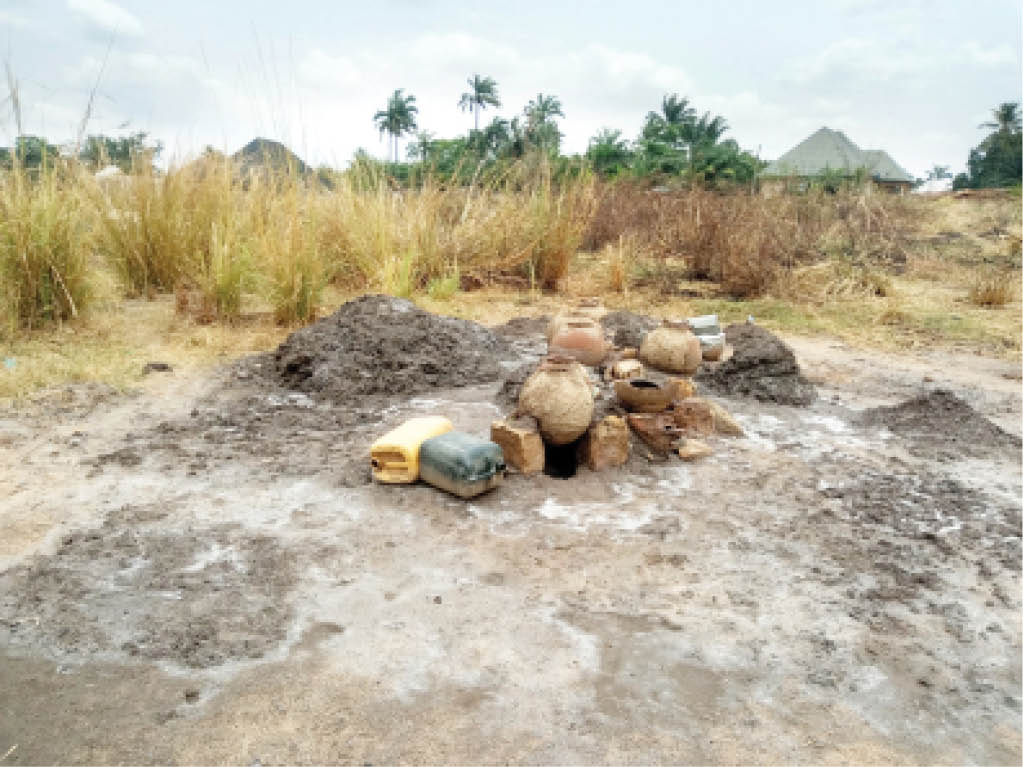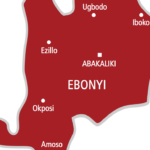Salt deposits found in Okposi and Uburu communities, Ebonyi State, could help the country in its efforts to diversify the economy through industrialisation. But the myth behind the lakes is that the commodity cannot be produced in a large commercial quantity due to traditional beliefs. Daily Trust on Sunday visited the salt lakes and reports.
The popular Okposi salt lake is among the amazing wonders of nature, owing to its great features and historical background. The lake is located at Ivuezizor at Okposi Okwu in Ohaozara Local Government Area of Ebonyi State.
It is a few kilometers away from another salt lake located in Uburu community in the same local government area.
The Okposi salt solution is found in a lake which approximately covers not more than three plots of land, at 100×70 measurements.
From a close view, it is purely greenish and glitters, as well as surrounded by trees and grasses.
The lake is adored by indigenes of the community owing to a common heritage, myth and custom that surrounds it.
Daily Trust on Sunday gathered that the custom of the land is a common law that can never be violated. Anybody that violates it shall not go scot free as he or she would be dealt with by the goddess of the lake, including striking the offender with death or madness.
Speaking with our correspondent who visited the community on Friday, an 82-year-old woman, Mrs Evenly Aja, said the lake had been a major economic hub for women in the area.
Mrs Aja further explained that the historical belief and practice inherited from their forefathers had not been abandoned.
According to her, men are forbidden from fetching the salt solution from the lake or even assist the women to lift the pot containing it.
Gallons and other plastic materials are not used in fetching the salt solution from lake.
Visitors are also forbidden from walking into the lake or nearby with foot-wears. This includes women.
Also, any women observing her menstrual period must stay away from the lake and its surroundings.
“We inherited these norms and tradition from our forefathers,’’ she explained.
Another woman, Mrs Mary Nwite, said the major challenge hindering daily production of salt in the community was non availability of firewood to boil the solution.
Mrs Nwite, a mother of six, who also lost her husband after 12 years of marriage, said she trained three of her children to higher institutions from the money she made from the salt business.
“This is my only business. It is from this salt business that I have been feeding myself and my six children after the death of my husband.
“Three of my children attended higher institutions, and it was the money I made from this salt business that I used to pay their school fees.
“The salt is processed by boiling; that is why firewood remains the only challenge facing us. As the solution boils you will keep on adding firewood so as to get enough salt to sell.
“To get a huge salt to sell, you must boil it for about 12 hours, depending on the solution you have.
“I have the ones for N300, N400, N500 and above,’’ she said.
Also speaking to Daily Trust on Sunday, the secretary of the Okposi Youths Development Union, village branch, Mr Samuel Onyenaturuchi, said efforts made to modernise the method of processing the salt had not been successful.

According to him, one of such modernisation efforts was made during the era tenure of a former governor of the state, Chief Martin Elechi, through his wife, Josephine.
He added that another effort was made by a team of American miners.
“They made efforts to install a machine inside the lake and run a pipe from there to this very place (outside), but both the machine and the pipe got damaged.
“So from all indications, the goddess of our salt lake doesn’t need technology. And the reason is simple: If that happens, it will entirely destroy the tradition, norm and belief that govern the lake. So the gods will not allow it to happen,’’ he explained.
Daily Trust on Sunday, however, gathered that aquatic animals, such as fish, stockfish and crocodile exist in the lake, but it is forbidden for anyone to kill or eat them.
Speaking on the amazing nature of the lake, Mr Benson Agwu, who, by virtue of custom, is a prince in the village, told our correspondent that no matter how heavily rain fails, the lake can never be flooded or overflow its bank.
“But from the other end where there is little flow of the lake to another lake nearby is not salty when you test it. That is the amazing thing in this lake,’’ he said.
Prince Agwu said the lake was discovered by two hunters who were thirsty while in the forest.
“According to the legend handed over to us by our forefathers, when the two hunters who were in the forest in search of animals saw the water, they felt relieved and happy that their thirst would be quenched. But when they fetched the water in their palms they discovered that it was not drinkable as it was very salty,’’ he said.
He added that in an attempt to preserve the lake, the hunters made a human sacrifice.
“It was one of the hunters who brought his only child (daughter) for that purpose.
According to history, the hunters were told by the gods that the only way to secure the lake was for them to sacrifice one of their most cherished things on earth.
“And the only thing that was very precious to one of the hunters was his daughter, so she was sacrificed. That is why the salt is not seasonal,’’ he explained.
Our correspondent, however, gathered that there are different versions of the history surrounding the salt lake.
Another indigene of the community, Mr Samuel Udeogu, told Daily Trust on Sunday that Okposi is made up of two villages: Okposi Achara and Okposi Okwu.
He corroborated the story that efforts to modernise the process of producing salt from the lake had not been successful. He, however, said that assertion depended of the political will of the government of the day, adding, “I don’t believe in the mysticism surrounding the lake.’’
“If the salt is produced in large commercial quantity, it can give over 2,000 persons jobs in Okposi. The salt from this lake is superior and unique to others.
“During the civil war, it was the major source of our economy. Because of the presence of the lake, Okposi never suffered kwashiorkor. That Biafran soldiers ate food with salt was because of that lake. Many people from Igbo land get salt to cook from this lake,’’ he noted.

Also speaking on the lake, the chairman of the Academic Staff Union of Universities (ASUU), Ebonyi State University chapter, Professor Ikechukwu Ugwuenyi, who also hails from the community, acknowledged the story that a human sacrifice was made to preserve it.
He said the two hunters who discovered the lake came from the two villages that make up the Okposi community.
“According to history made available to me, when the oracle of the land told the hunters what to do to preserve the lake, the first hunter who saw it declined while the other one accepted and offered the sacrifice. The other hunter, however, asked for a share in the lake, which is a common practice among hunters.
“That is why till date, it is his family that provides the chief priest of the lake. That was how the taboos came into existence, according to the order of the oracle of our land.
“This lake is not something you can mine. A team of German miners, Americans and the state government tried, but they failed.
“The Americans drilled a borehole for the purpose of pumping the solution from the lake to the bank, but it failed.
“Again, no matter the amount of rainfall, the lake can never be flooded. And the exit point separated itself from the salty nature to normal water test.
“Yes, a sacrifice was made, but it was not a male child. The offer was too cumbersome, that was why the other hunter declined. But I will not go into details because it is not a good thing to say,’’ he added.
Uburu salt lake
At Uburu, the features of the salt lake differ from the ones in Okposi.
Our correspondent who visited the lake observed that it dried up during the dry season, unlike that of Okposi, which is not seasonal.
Another feature is that the women of Uburu community first filter the salt solution before boiling.
Describing the process of producing salt from the lake, a widow, Victoria Akpa, who said she depended on the business for survival said, “Here, we collect the solution, pour it into a drum or basin and use firewood to boil it. That is how we get salt from the lake. And the boiling does not take long.
“To collect the solution you are expected to use a calabash. You will make a space at the lake where you will place the calabash, which is perforated under with a broom to allow the solution to drop into another pot, which is the one you will boil to get salt.
“In this lake, the fish are killed and eaten, unlike that of Okposi.
“Also, there is a mermaid we refer to as the goddess of the lake, which always appears. And you cannot get her on camera. At night, the mermaid usually comes out with a lamp in her hand and walks around the lake.
“Any woman observing her menstruation is forbidden from coming to the lake. Also, as a woman, before you come here to get a salt solution, traditionally they must cut your hair.
“The business is for women alone; men are not allowed to come here.
“Our salt tests better than that of Okposi,’’ she claimed.

 Join Daily Trust WhatsApp Community For Quick Access To News and Happenings Around You.
Join Daily Trust WhatsApp Community For Quick Access To News and Happenings Around You.

